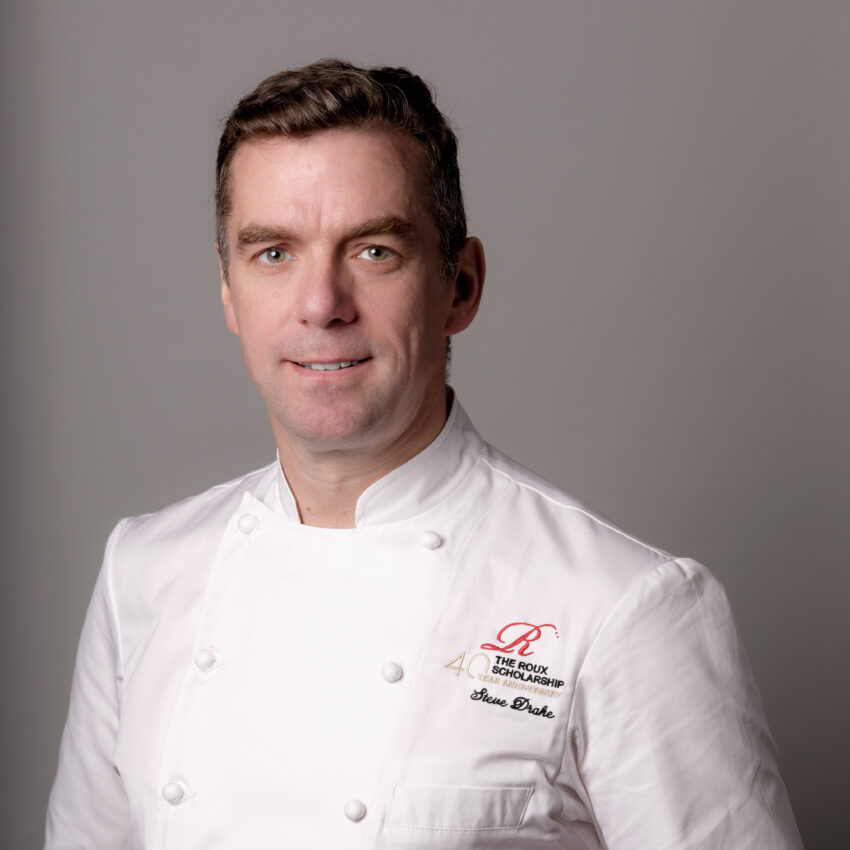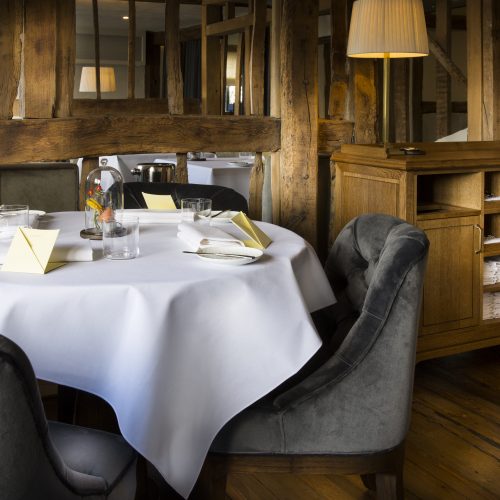2001
Steve Drake
“I feel very proud to be a Roux Scholar; it’s helped me tremendously and encouraged me to push forward and forge my own path. ”

Steve won in 2001 and did his stage with Marc Veyrat at the L’Auberge De L’Eridan, Lake Annecy, France. He is now Chef Proprietor of Sorrel in Dorking.
While at school, Steve had a weekend job making bacon sandwiches at a truckers' café. On leaving school, Steve went straight to London where his cooking journey continued in a rather more sophisticated environment: he was an apprentice at The Ritz. He then went on to work with Nico Ladenis as a commis chef at the tender age of 18, before going on to work with the likes of Tom Aikens and Marco Pierre White.
In 2000, Steve opened his first restaurant, Drake’s On the Pond in Abinger Hammer, winning the Roux Scholarship shortly afterwards. He won a Michelin star there in 2003 and then re-opened Drake’s in Ripley in 2004 where he also held a star for a further 14 years.
At the end of the summer in 2016, Steve sold Drake’s and opened Sorrel, a modern fine dining restaurant in Dorking. Steve and his team focus on flavour and balance those flavours, and technique of cooking and letting each ingredient play its role. For Steve, food is something for flavour, not visual, and every dish is inspired by a discovery and the journey each ingredient can take you on through its layers of flavour; the last thing the team think about when creating a new dish is the presentation of food.
Sorrel was included in the Michelin Guide 2019, being awarded a Michelin star less than a year after opening. Sorrel also won AA Restaurant of the Year 2018-19 (England), and holds 4 AA Rosettes.

Where did you do your stage?
For my stage, I went to Marc Veyrat’s restaurant L’Auberge De L’Eridan. Not wanting to follow the ‘norm’, I wanted to work somewhere different and under someone who was pushing culinary boundaries – Marc was one of the first chefs to start doing tasting menus, which would often run to 20 courses, but which many other top French chefs were critical of at the time. With Marc, the food was appeared simple and relied on the quality and effortlessness of the ingredients. One of the greatest dishes was John Dory cooked on a stone. The diner would eat the fish straight from the stone, and when the juices ran out, they sizzled satisfyingly on the hot surface. The only accompaniment was a simple mountain herb from up the hillside; so many of the dishes were like this and the whole experience was just a harmony of flavours.
What did you cook in the final?
For the final, I cooked a timbale of langoustine tails served with a Nantua (crayfish) sauce – the timbale was interpreted in its original Escoffier sense as a vol-au-vent. I was very happy with my dish and I felt I had done my very best whatever the outcome – thankfully it was the best result I could hope for. Keith Stanley who was the chef de cuisine of The Ritz when I worked there, had ten years previously taught me to turn mushrooms, which came in very handy as the dish required this. I remember the pastry being very tricky as we were all sharing the same oven meaning the door kept being opened and dropping in temperature. I put a lot of focus on the sauce and used all the time I had available to make it perfect, so I started this first and it was also my last job to finish the dish.
How many times did you enter?
I entered the competition three times and was fortunate enough to win the third time; this was my third and final attempt as back then the maximum age was 28. I took an all-or-nothing approach and, after my previous finals, had gained some invaluable experience. I just zoned everything out and cooked. It is such a great feeling to achieve something that I worked so hard to for, I was so happy and felt I’d joined the club (a was of course a little relived too).
What do you remember most about the competition the year you won?
I remember being on stage and thinking, 'Simon Hulstone has won this.' He’s a good friend of mine and a great competition chef and I felt confident he had done enough to win, despite being really happy with what I’d achieved. I was really happy though that he won in 2003.
What advice would you give applicants?
Firstly, the written entry is crucial, so make sure you put time and consideration into this. The dish must make sense. If you get selected, you have quite a long period of time before you actually have to cook your dish – it can build up to quite a lot of pressure, so try not to overthink it too much. But do make sure you practice your regional dish four or five times in advance to make sure it tastes amazing – but don’t overdo it, as this can be just as bad as being underprepared. You can’t prepare for the final – you just have to turn up so there is no point over-thinking and stressing about it! The pressure is off, and you have no idea what the dish is until the day; just focus on technique, seasoning, and a nice balance of flavour.
Who are your culinary heroes?
I think it goes without saying how inspirational Michel was, and the belief he showed in the scholars – he championed us all. Nico Ladenis was also a huge inspiration for my early career. Outside of cooking it must be Sir Dave Brailsford and his marginal gains theory towards cycling. Its certainly helped me - all about slow improvements, nuanced and delicate with flavour and understanding it more. I’m still learning all the time.
What is it like to be a Roux Scholar?
I feel very proud to be a Roux Scholar; it’s helped me tremendously and encouraged me to push forward and forge my own path. It really is a family and I’ve made many friends through the scholarship.
Tell us about your restaurant?
My restaurant Sorrel is very different from the restaurant I was trained in. The food light and flavour focused, for me the most important thing is a technique and the balance of flavour. That, together with intriguing ingredients and combinations that are not gimmicky, is what Sorrel is all about.